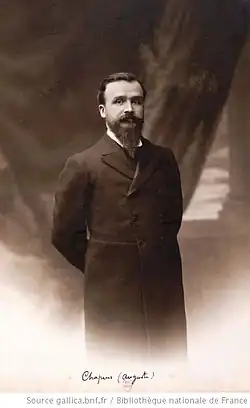Auguste Chapuis
Auguste Chapuis | |
|---|---|
 Auguste Chapuis in 1905 | |
| Born | 20 April 1858 |
| Died | 6 December 1933 (aged 75) |
| Occupation(s) | Composer, organist |
Auguste Chapuis (French pronunciation: [oɡyst ʃapɥi]; 25 April 1858 – 6 December 1933) was a 19th/20th century French composer, organist, and professor. He was a student with César Franck. The rue Auguste-Chapuis in the 20th arrondissement of Paris was named after him when he died in 1933.
He was awarded the Prix Rossini in 1886 for Les Jardins d'Armide on a libretto by the playwright Émile Moreau.
In 1894, he succeeded Adolphe Danhauser as head of the municipal orphéon of Paris.
Two scores were dedicated to him, one by Jacques Charlot, Chanson (1910), for piano, and the other one by Samuel Rousseau, 12 Pièces for organ.
Works (selection)
- 2 Pièces pour violoncelle, avec piano (1890)
- Solo de trompette en fa, avec piano (1899)
- Enguerrande, lyrical drama in 4 acts and 5 tableaux, libretto by Victor Wilder after the poem by Émile Bergerat, created at the Opéra-Comique on 9 may 1892. Choudens 1892 [1]
- Poèmes d'amour, lyrics by Rodolphe Darzens 1895
- Impressions sylvestres, 5 pieces for Cello & Piano (1906)[2]
- Fantaisie concertante for double bass and piano. Durand 1907
- Si mes vers avaient des ailes (1909, poem by Victor Hugo)
- Le poème du travail (1911, words by Maurice Bouchor) for tenor solo, choir and orchestra (70 pages)
- Les deux ménétriers (1912, poem by Jean Richepin), choir for 4 voices
- Piano trio (1912)
- La Chanson du Charbonnier (1903) - song of the Charcoal-burner (poem by André Theuriet), choir for 4 voices and orchestra[3]
- Violin Sonata (1921)
- Les Demoiselles de St. Cyr, musical comedy in four acts based on the play by Alexandre Dumas. Score chant and piano.[4]
- 2 Pièces pour hautbois et piano (1922)
- Harpe éolienne ; Carillon ; David devant l'arche, in Fresque marine, Vol. 1, by Alexander Rider (harp)[5]
- Choral pour contrebasse et piano (1924)
- 3 Pièces pour flûte et piano (1927): Pastorale ; L'étoile du berger ; Faunes et dryades dansent au clair de lune
- Vocalise-Étude[6]
- Three pieces for piano: L'Aurore sur le lac ; Dans la montagne ; Rondes enfantines. Durand 1931
- Ronde, score for 2 female voices or children song. Durand & Cie
- Tambourin, score for 2 female voices or children song. Durand & Cie
- Le Chêne abattu, choir for three equal voices. Score for chant. Durand & Cie
References
- ^ Enguerrande sur Google Books
- ^ [1] : Gallica
- ^ [ https://www.abebooks.it/spartiti/CHAPUIS-Auguste-Chanson-Charbonnier-Chant-Orchestre/22733153402/bd#&gid=1&pid=1] Abebooks
- ^ Chaudens 1921
- ^ [2] L'Ere nouvelle, January 20, 1924, on Gallica
- ^ Part of a collection of Vocalises-Études commissioned from various composers and compiled into a single volume by Amédée-Louis Hettich (1930) : [3]